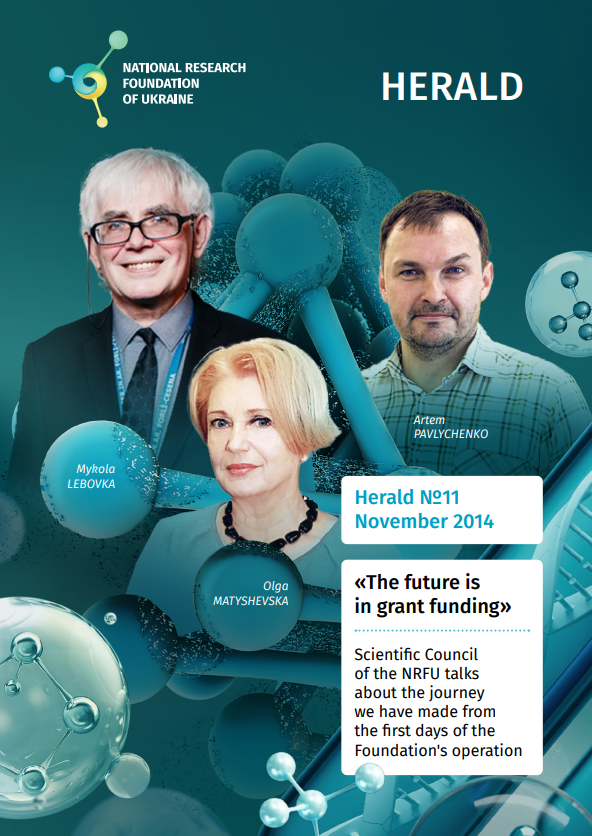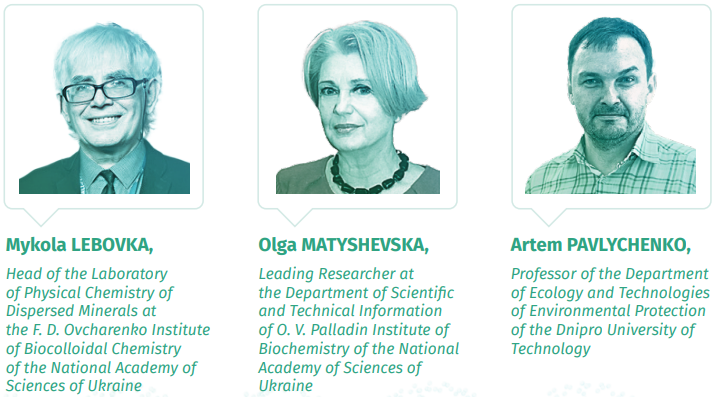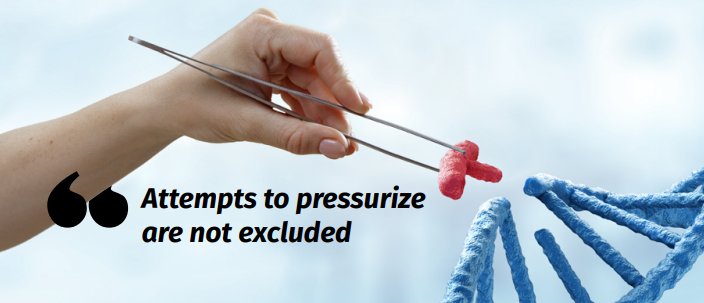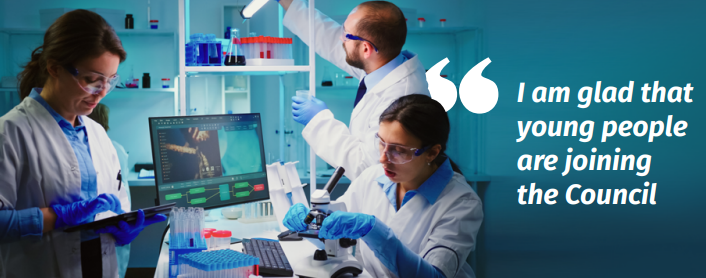
Recently, 18 new members of the Scientific Council of the National Research Foundation of Ukraine (NRFU) were elected. This year is end of term for many of the researchers in the Council. These researchers were the pioneers of the Foundation, developed regulations and improved the work of the new institution.
What do they remember about this journey? What was the motivation of people who did not expect ideal working conditions?
We asked these and other questions to Mykola LEBOVKA, Head of the Laboratory of Physical Chemistry of Dispersed Minerals at the F. D. Ovcharenko Institute of Biocolloidal Chemistry of the National Academy of Sciences of Ukraine, Olga MATYSHEVSKA, Leading Researcher at the Department of Scientific and Technical Information of O. V. Palladin Institute of Biochemistry of the National Academy of Sciences of Ukraine, and Artem PAVLYCHENKO, Professor of the Department of Ecology and Technologies of Environmental Protection of the Dnipro University of Technology.

– Please tell us how you joined the Scientific Council of the NRFU? What was your motivation for working at the Foundation?
Mykola LEBOVKA: For more than two decades, since the restoration of Ukraine’s independence, there have been no significant changes in the field of scientific and technical activities. They began after the Revolution of Dignity, when the Verkhovna Rada adopted a new Law ‘On Scientific and Scientific and Technical Activities’. The law provided for the establishment of the National Research Foundation of Ukraine, the Identification Committee on Science, the Scientific Committee, etc.
In 2018, the competition for the Scientific Council of the NRFU was launched. I submitted my documents for election to the Scientific Council upon the recommendation of my research institution. My motivation was simple: I wanted to join the creation of conditions for the development of the research sphere. I fully realized that the work would be on a voluntary basis, that I would not be able to apply for calls. I thought and still do that it was the right thing.
I spend a lot of time working in the Scientific Council. But I have no regrets about the decision I made. The people I work with are high-level specialists, and the decisions made by the Scientific Council are important for the development of research.
Olga MATYSHEVSKA: My candidacy for the Scientific Council was nominated and supported at the meeting of the Academic Council of the Palladin Institute of Biochemistry. I was inspired by the idea to create a Foundation that selects the best research projects on a competitive basis. We had dreaming for years that researchers would receive decent funding, and early-career researchers would do their research at home in Ukraine.
We were also attracted by the prospect of working with leading researchers. The members of the Medicine and Biology Section were academicians of the National Academy of Sciences of Ukraine Maryna Skok and Oleksii Soldatkin, representatives of research institutions from Kyiv, Kherson, Vinnytsia, and Sumy. It is an honor for every researcher to work with researchers of such caliber.
Artem PAVLYCHENKO: I wanted to be useful. I realized that the work would be unpaid, but it didn’t deter me. I have never regretted this decision. Grant funding from the NRFU has helped to preserve quite a lot of research schools, to keep both young and experienced researchers in science. I also wanted to change the practice of submitting documents for calls ‘in binders’. I am glad that this problem has been solved.

– What was the most complicated thing at the beginning of your work? Did you expect it to be like this?
Mykola LEBOVKA: At the beginning of the Council’s work, we elected the first chairman of the NRFU, Leonid Yatsenko, and chair persons of the scientific councils of the sections. It was the right decision to elect Professor Yatsenko who always listened to the opinions of the Council members and united the entire team. Today, Professor Stanislav Vilchynskii is doing the same.
We had little experience in writing regulations, we gained this experience while working. Also, in the first months, the Council meetings lasted for many hours, which was very difficult. Eventually, we agreed to reduce the time to two hours.
Sometimes, members of the Scientific Council spoke harshly about the opinions of other participants. But gradually, everything got better, and in the second term of the Scientific Council we never had conflicts. Although, sometimes we discuss an issue for two hours, and our opinions differ.
Olga MATYSHEVSKA: Before I started working in the Scientific Council, I thought that some issues (e.g., optimization of the assessment procedure of applications) could be solved quite fast. When I started working, I realized that we need to change the regulatory framework, it is a systematic and long-term work. Work of the Foundation is strictly regulated, for example, by the Law of Ukraine ‘On Scientific and Scientific and Technical Activities’ and government regulations. We had to deal with this in the course of our work.
Artem PAVLYCHENKO: During my first speeches, I was often nervous, but my senior colleagues always supported me. Professor Tetiana Prikhna worked next to me at offline meetings, and during breaks I could talk to a legend of Ukrainian science, Professor Leonid Yatsenko.
I was pleasantly surprised by how selflessly the entire Scientific Council team works. Without any complaints, people worked late into the evening to secure funding for research. We could not betray the trust of the research community in the Foundation. These funds were used to support teams that implemented projects important for the economy, defense, social development, etc.

– What challenges and menaces to the work of the NRFU did the members of the Scientific Council face? How did you manage to overcome these challenges?
Mykola LEBOVKA: One of the menaces to the work of the Foundation was an attempt to push through the quota principle for the formation of the Supervisory Board of the NRFU. In 2021, the Ministry of Education and Science of Ukraine initiated amendments to the Law ‘On Scientific and Scientific and Technical Activities’, in particular, with a proposal to form the Supervisory Board on a quota basis. But during the Committee hearings in the Verkhovna Rada, these proposals were not supported.
The Executive Director of the Foundation also faced baseless attacks on some media and social networks. Unfortunately, such attacks take away time and energy needed for really important things.
Olga MATYSHEVSKA: There were many issues and challenges. Thanks to the systematic work of the NRFU and the support of the research community, many of them have been coped with.
Artem PAVLYCHENKO: There were situations when decisions had to be made very quickly. I am glad that the Scientific Council consists of competent and courageous specialists who can correctly assess the situation and take responsibility for a particular decision.
There have been various challenges. The understanding of what teamwork is was formed very gradually in the research community. In the beginning, some groups thought that to win, it was enough to include people with high citation indexes and publications in Scopus and Web of Science. But this is not enough. We analysed how long the team had been working, whether they had previously applied for grants, how they had done research and published papers.
It was also quite difficult to build trust between the representatives of each of the three sections. Economists, natural science researchers, representatives of humanities, technical and other fields of science work in the Scientific Council. Sometimes STEM specialists did not understand the importance of humanitarian projects. But we managed to build this trust and agreed that if a member of the Scientific Council offers a solution in the field in which he/she is a professional, others trust him/her.

– The very first calls of the NRFU showed that it is possible to perform breakthrough research and receive a decent salary in Ukraine. It is not surprising that the competition in our calls is tough, and the work of Call Commissions (Panels) and reviewers is in the center of attention of the research community. What has been improved in the work of the call commissions, the applications assessment procedure, the quality of the review, and the reporting system? In other words, how is the Foundation evolving?
Mykola LEBOVKA: From the very beginning, our Scientific Council decided to create separate call commissions for each of the calls. These commissions select reviewers for projects and decide on the rating of projects. I would like to mention that the Scientific Council does not affect the results of the calls and practically does not interfere with the work of the call commissions and the reviewers.
One of the biggest issues is the selection of three qualified reviewers for each project (one of them must be foreign for some calls). There have been cases when registered reviewers had low research performance and provided biased assessments of projects. Therefore, the members of the Scientific Councils of sections have analyzed the evaluations by reviewers and identified those who were biased. Based on the results of the analysis, a special procedure for weighted project assessment was designed.
Another issue in the Foundation’s work is the bureaucratization of grant administration. Researchers complain that they spend time preparing meaningless justifications for projects implementation. However, the number of reports has still decreased – at the beginning of our work, reports had to be submitted quarterly, and now interim reports are submitted once a year.
Looking back at the path traveled, I can say that there have been significant changes in the work of the Foundation indeed.
In the future, I think it is worth expanding the number of calls based on the bottom-up principle. It is also necessary to further improve the regulatory framework, in the first place regarding the simplification of the procurement of unique equipment.
Olga MATYSHEVSKA: One of the problems is that a significant number of applications are rejected on formal grounds. Currently, the Foundation and the Ministry of Education and Science of Ukraine are preparing amendments to the regulations that will optimize the analysis of applications submitted to the call. In particular, it is proposed to give the applicant on opportunity to clarify the submitted information within five days.
I believe that the successful call ‘Infrastructures for Advanced Research’ is a compelling indicator of the Foundation’s evolution. This is the first call the winners of which have the opportunity to use the maximum funding (up to UAH 30 million) for the development of research infrastructures. Research laboratories will become the basis for our country’s new research infrastructure.
And, of course, we need research solutions to support our country’s defense capability, develop technologies for rehabilitation of the military and civilians, and strengthen Ukraine’s postwar potential. These solutions can be found through connecting the results of basic and applied research. Therefore, the Scientific Council has made a preliminary decision to respective calls in 2025.
Artem PAVLYCHENKO: I am glad that my proposal was supported, so that the project teams of the call ‘Support for Research of Leading and Young Scientists’ included 50 percent of early-career researchers. The innovation worked: a lot of applications were submitted to the call.
One of the positive changes is that we have created a formula for calls in certain areas. This is how the ‘Infrastructures for Advanced Research’ call was held.
There has never been a single hopeless situation during the Foundation’s work. I would like to emphasize that every time we took the side of the grantees.

– Do you remember how the Scientific Council worked in the first year of the war?
Mykola LEBOVKA: With the start of the full-scale invasion, the Foundation’s funds were redirected to cover the country’s defense needs, funding for existing projects was suspended, and the completion of new calls was postponed. In the first weeks of the war, the Scientific Council, the Scientific Committee, and the Foundation’s Executive Director began to search for contacts with international organisations and opportunities to raise external funds.
In the summer, amendments to the regulatory framework were adopted and the Foundation was able to hold joint calls with foreign organisations. Direct contacts were established with the European Commission, Science Europe Association, the Swiss National Science Foundation (SNSF), the University of Cambridge and other institutions. This cooperation resulted in new calls of the Foundation.
Olga MATYSHEVSKA: We had to make any cooperation with the enemy impossible. That is why the Scientific Council approved amendments to the Regulations on Compliance with the Principles of Research Ethics which states that cooperation with representatives of the aggressor country is unacceptable.
In 2022, the Scientific Council developed the terms and conditions of a new call ‘Science for the Recovery of Ukraine in the War and Post-war Periods’ and announced its launch. In 2023, funding for the NRFU from the state budget was restored and the Foundation signed grant agreements with 67 winners of this call.
Artem PAVLYCHENKO: The war came as a shock, but we continued to work. In particular, we designed new calls aimed at improving Ukraine’s defense capacity.
We were supported by colleagues from around the world. For instance, when we lacked reviewers, foreign research foundations added us to their databases and our projects were assessed by foreign reviewers.

– What challenges do you think the Foundation may face in the next year or two?
Mykola LEBOVKA: The Foundation was created by researchers and is managed by researchers. The NRFU is independent of the Ministry of Education and Science of Ukraine, other central executive authorities, and the National Academy of Sciences of Ukraine. This was confirmed at the Parliamentary hearings at the Committee on Education, Science and Innovation in June 2021 as well.
Despite this, attempts to put pressure on the Foundation continue (for example, through inspections). I do not exclude additional inspections and attempts to put pressure in the future. In previous years, the Scientific Council has given a worthy rebuff to such attempts. I hope that the next composition of the Council will also be resolute and united.
Olga MATYSHEVSKA: There have been and will be difficulties, and you should be prepared for anything.
Artem PAVLYCHENKO: There will always be challenges, and there is not a single researcher who is satisfied with the amount of funding for a project, for example. But such dissatisfaction encourages us to move forward, search for funds, and improve the situation.

– Please recall the most challenging and the most rewarding situation during your time at the Scientific Council. What actions and efforts are you proud of?
Mykola LEBOVKA: The most difficult situation was in 2022, when funding for grant projects of the NRFU was suspended. The decision of the Foundation to allow submitting updated applications for new calls in 2023 was a joyful event. It’s nice that we all work fruitfully in the Scientific Council and find a common language.
Olga MATYSHEVSKA: I felt proud when I saw that despite the enemy’s attacks, air raids, shellings, and destructions, members of the Scientific Council from Kharkiv, Sumy, Kherson, Dnipro, and other cities continue to work.
The results of the calls and reports of the winning projects again and again prove how powerful the research potential of Ukraine is. This strengthens the belief that after the victory we will build a new country, strong and modern.
Artem PAVLYCHENKO: I felt incredibly happy when I looked at the lists of the first successful projects. I have the same feeling after we finalize new calls every year.
I remember how happy we all were when Ivan Moysiyenko, who managed to leave the occupied Kherson, joined the meeting of the Council…
It is very good that many early-career researchers (both PhDs and Doctors of Sciences) have been elected to the second term of the Scientific Council. It is important to involve them in the work. If we want to keep young people in science, we need to hear and understand their needs. The fact that young people come to the Scientific Council shows that the research community supports the Foundation.
Today is the time of breakthrough technologies. It is important to have scientific intuition to support an application that is aimed at finding new solutions. It is sometimes very difficult to identify such an application. I have great respect for Stanislav Vilchynskii, the Foundation’s Chairman, and Olga Polotska, Executive Director, who hear the needs of researchers.

– What expectations do you have of the composition of the new Scientific Council? What would you like to say to those who will come after you?
Mykola LEBOVKA: New members of the Council have recently been elected. They are well-known researchers, many of them have considerable experience in administrative work. First of all, I would like to wish the new members harmony and creative work in developing more effective methods of projects selection and assessment.
I hope that the renewed composition of the Scientific Council will solve the problem of remuneration of foreign reviewers (this needs to be resolved at the legislative level).
…There has been a lot of pressure on the Foundation. Some institutions wanted to have their ‘own people’ in the Foundation, to have influence on the distribution of funding, but we knew that we could not give in. We rallied and survived. I wish resilience to those who will continue the work.
Olga MATYSHEVSKA: I hope that the next Scientific Council will be, first of all, highly professional. I would like to wish the new members of the Council to work in an environment where all proposals to ensure the work of the Foundation will be supported. It is important to believe in the development of science in Ukraine, to be sure that progress in this area depends on you as well.
Artem PAVLYCHENKO: I have seen the results of the competitive selection to the Scientific Council, these are very respected people. This shows that the Scientific Council of the NRFU is supported by the community. I am glad that I will have the opportunity to work with them for another two years.
It is always difficult to be first. Personally, it was not easy for me to decide on the second term in the Scientific Council. I piled all the documents and hesitated for a long time, not believing that I would be able to pass. I literally sent my application at the last minute…
My expertise covers the area of environmental safety. Sometimes we have to terminate a project if its implementation is of poor quality. I wish the new Council members not to be afraid to take responsibility.
Grant funding from the NRFU is an opportunity to preserve and develop research in our country. Our researchers are no worse than those abroad. They should have a chance to realise themselves at home, in Ukraine, and give the country a chance to become stronger.
Interviewed by Svitlana GALATA

